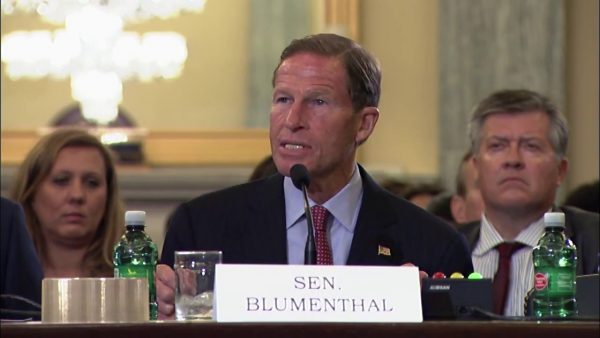
You can always count on a corporation to look out for its own interests. An existential threat to their business model will even trump the good PR that comes from beating on everyone’s favorite marginalized punching bags, sex workers). So, until recently, major tech companies like Facebook, Amazon, Twitter, and Google opposed SESTA,the Stop Enabling Sex Traffickers Act. Their business models depend on user-generated content, and SESTA would overhaul Section 230 of the Communications Decency Act of 1996 which previously protected internet platforms against liability for the actions of users.
But following a compromise earlier this month between Silicon Valley and the bill’s Congressional sponsors, SESTA has passed the House and is headed to the Senate. Though they tried to keep their involvement quiet, cloaking their advocacy in the lobbying group the Internet Association, tech companies pushed hard for changes to the bill. An amended version of the bill released on November 3 by Senator John Thune addressed many of their concerns. Initially, SESTA took aim at any facilitation of user sex trafficking. But an amendment to the bill now specifies only “knowing conduct” as “participation in a venture,” meaning in general terms that sex worker advertising sites are now the only ones on the hook while Facebook and company remain immune from sex trafficking liability. Another key revision that spurred a change in the Internet Association’s position involved the development of bots policing content. In earlier versions of SESTA, developing such bots would constitute knowledge of the platform being used to facilitate sex trafficking. Similarly, Backpage’s keyword filters for policing content were used in its Senate hearing as evidence that it had knowledge of and was facilitating sex trafficking. Its own reporting efforts were used against it.
The bill also now specifies that state law enforcement officials using SESTA to prosecute individuals or entities would have to use federal law as a basis for their actions. That’s very handy for the tech companies, as in some states, “sex trafficking” can mean just about anything. While the federal definition of sex trafficking involves force, fraud, or coercion (or the involvement of minors, though this leads to situations in which young street youth get arrested for trafficking for helping their friends in the business as soon as they turn 18), a number of states, such as Alaska, have much broader definitions. This can include cases such as two escorts simply working together. A 2012 records request found that two such escorts were arrested and charged with sex trafficking as well as with prostitution—both alleged victims were arrested and charged with sex trafficking each other.
The bill remains draconian. There are enormous liabilities attached to user content for internet companies, which is a huge incentive to police that content heavily. Platforms that host advertising for sex workers are definitely still in the crosshairs. In fact, as the Electronic Frontier Foundation (EFF) points out, SESTA will even target companies retroactively, a measure that was no doubt included as a way to go after Backpage. No actual intention to assist in any sex trafficking is necessary in the newest version of the bill either, so long as it is “facilitated” in some way, a term which courts have interpreted broadly.
A technology industry source told Axios that the tech companies see supporting SESTA as a necessary strategic move in the current climate. “This is grudging, but a recognition of the politics,” the source said. Silicon Valley can’t risk any further opposition to a bipartisan bill “nobly” battling sex trafficking, especially on the heels of congressional hearings about its role allowing Russian election propaganda on platforms in 2016. And SESTA opposition only became more uncomfortable for Google, Twitter, Facebook and company when smaller competitor tech and media companies like Oracle, Disney, and 21st Century Fox took the political opportunity to support the sex trafficking bill. So the Internet Association made an about face after it ensured the bill would be amended and released a statement this month signaling its support of the legislation.
Obviously, going after platforms that could be used to facilitate sex trafficking is hardly universally recognized as the most effective way to aid victims. Freedom Network USA is a rights-based coalition formed around opposition to sex and labor trafficking. They write, in opposition to SESTA,
Human trafficking survivors need increased access to comprehensive services and increased accountability for the traffickers who are masterminding this exploitation. And yet every year the US government provides services and support to only a fraction of the trafficking victims seeking assistance, while providers report waitlists. Survivors continue to be arrested for their victimization and mandated into counseling, while they struggle to find affordable housing and sustainable employment. Complex investigations into human trafficking networks are underfunded, human trafficking prosecutions remain woefully low, and prosecutions of labor trafficking are nearly nonexistent.

In the same document, they also express concern that victims will be driven underground where they will be more difficult to identify and assist. Similarly, the Sex Workers Project at the Urban Justice Center has documented the abuses that occur when sex trafficking is pursued with a blunt hammer rather than with finesse and victim assistance, particularly when raids are used.
SESTA has seen support from many of the usual suspects. CATW (Coalition Against Trafficking In Women) is, of course, well known to Tits and Sass readers for their reaction to Amnesty International’s heavily researched decision to support the decriminalization of sex work in 2015. This involved much wailing and gnashing of teeth on their part, plus a celebrity petition that was widely mocked. It is no real surprise, then, that their director tweeted her support for SESTA, retweeting another usual suspect—Shared Hope International. That said, not all the organizations the CATW director tagged en masse in this tweet are likely to endorse her view, particularly the New York Anti-Trafficking Network, which has a history of expressing more nuanced ideas.
Instead of embracing any sort of nuance when it comes to sex work, many SESTA supporters stretch the bounds of credulity in their missions, such as the National Center on Sexual Exploitation (NCSE), who are strong supporters of SESTA. Their main moral crusade is not centered around sex trafficking, but around pornography, which they consider to be a “public health crisis.” They publish a Dirty Dozen list of organizations that “perpetuate sexual exploitation.” On the list? Amnesty International, of course, for endorsing the decriminalization of prostitution, as well as the Justice Department for failing to enforce obscenity laws against pornography. Even the American Library Association makes the cut, for, I kid you not, making libraries into “a XXX space that fosters child sexual abuse.”
Even beyond the aims of censoring pornography, SESTA raises a number of implications for free speech. As Mike Masnick points out at Techdirt, weakening Section 230 will be a huge boon to people looking to suppress speech online that they dislike. We see this already in the use of DMCA takedowns, which are widely weaponized in service to censorship even in the absence of an actual copyright claim. When companies receive a DMCA takedown notice, it is often simpler to comply with any and all notices than to investigate the legitimacy of individual claims
Masnick writes, “Here, the potential problems are much, much worse. Because at least within the DMCA context, you have relatively limited damages…compared to SESTA at least […] [whose] civil penalties show no upper bound under the law — meaning the potential monetary penalty may be significantly higher.” That’s not even taking the criminal penalties into account.
Section 230 is also already a popular target for litigants attempting to sue platforms for political or cultural content that they dislike. And SESTA is likely to more seriously affect small companies and nonprofits such as Wikipedia, that do not have the resources to face any kind of claim against them.
This extreme bill is far-reaching, and especially so for sex workers. If you think platforms censor you now, you have not seen anything yet. Google has successfully lobbied for their moderation bots and they are likely to be sweeping and vicious. Now that Google has dropped their opposition, SESTA is likely to fly through both houses of Congress. Get ready for your political opinions to fall under attack as well—indeed, anything someone else might find objectionable. Say goodbye to many smaller platforms too (even Wikipedia?) as they fold under threat of lawsuits or criminal penalties.
Sigh… Well, when you sell out the country to Russia, for help to get elected, gerrymander the system, for the same, and tell everyone that a child molester should be elected, because “god wants him there, and god uses flawed people all the time!”, why not burn the internet to the ground with everything else, right?
NCSE is the reason why it’s harder to find good porn in hotels now.
They hate on Cosmo mag. I love that mag.
I can’t remember the last time I saw half naked American Apparel model on the back of Village Voice.
What’s wrong these people.
They are bullies.
[…] a bill winding its way through Congress for a while. Here at Tits and Sass, we’ve had plenty to say about it. SESTA, the Stop Enabling Sex Trafficking Act, the Senate version of the bill, would have been […]
[…] SESTA’s Growing Threat to the Sex Worker Internet How Congress Censored the Internet Sex Trafficking vs. Sex Work: What You Need to Know What the FOSTA/SESTA Anti-Sex Trafficking Bill Means […]